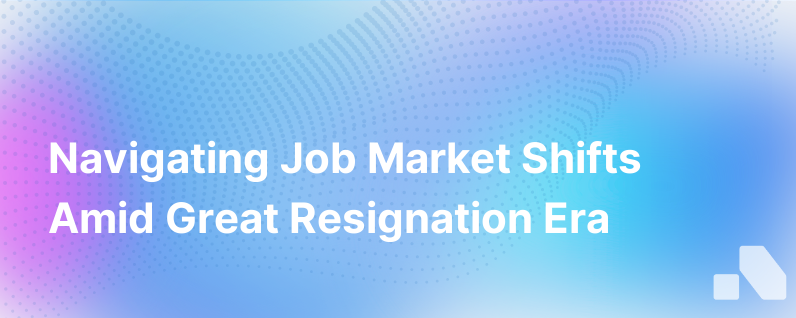The Changing Job Market Navigating The Cross Section Between The Great Resignation And The Current Economic Climate
Published on September 22, 2023 by Sawyer Middeleer
Navigating the tumultuous waves of the job market has always been a challenging endeavor, but the recent socio-economic metamorphoses have birthed unprecedented conditions. In a modern landscape where the Great Resignation intersects with the ongoing dynamism of the global economy, the ability to adapt and strategize is crucial for both employers and employees alike. No longer can talent acquisition and career development be seen through the prism of orthodox paradigms; they now demand innovative approaches and a nuanced understanding of the factors at play.
The Great Resignation: A Paradigm Shift in Employment
The Great Resignation, a movement that gained momentum in the aftermath of the global pandemic, saw millions of workers reevaluating their professional lives and leaving their jobs in search of something more fulfilling. This phenomenon, also termed "The Big Quit," signifies a marked departure from traditional job retention patterns and has sent shockwaves throughout various industries.
At the heart of the Great Resignation is a quest for increased flexibility, better work-life balance, and heightened job satisfaction. This has resulted in individuals prioritizing roles that offer remote work options, enhanced autonomy, comprehensive benefits, and opportunities for professional growth. The age of the worker-as-a-cog-in-the-machine is fading, replaced by aspirants who consider personal happiness and well-being as non-negotiables.
The Current Economic Climate: A Perplexing Puzzle
Meanwhile, the global economy is exhibiting a complex interplay of inflationary pressures, supply chain disruptions, geopolitical tensions, and shifts toward sustainability and digitization. These factors are contributing to workforce volatility and transforming employment opportunities. The tech sector’s rapid evolution, for example, has created a significant demand for digital skills, yet at the same time, even the most cutting-edge companies find themselves conducting layoffs to adjust for overzealous growth projections and changing market expectations.
Despite fears of a looming recession, which would traditionally cause widespread job insecurity, the labor market remains remarkably employee-driven in many sectors. Job openings are aplenty, yet businesses struggle to match their requirements with suitable candidates. The skill gap widens as education and career training lag behind technological advancements, fueling a peculiar dichotomy where high unemployment rates coexist with a scarcity of talent.
Navigating the Intersection: Strategies for Success
To navigate this intricate cross-section between the Great Resignation and volatile economic conditions, both job seekers and employers must embrace adaptability and foresight. Here are strategic considerations for navigating the present job market:
For Job Seekers:
- Invest in Continuous Learning: Thriving in a fast-paced world means uninterrupted upgrading of one's skillset. Online courses, certifications, and workshops targeted towards high-demand capabilities can significantly enhance employability.
- Embrace Flexibility: Flexibility isn't just a demand of the workforce; it's also a requirement for them. Being open to contract or freelance work, part-time roles, or even the willingness to pivot into emerging industries can open doors.
- Cultivate a Digital Presence: Building a personal brand through professional networks like LinkedIn and industry-specific platforms can attract the right opportunities and connections.
- Seek Companies that Align with Values: In line with motivations fueling the Great Resignation, candidates should look for workplaces that offer the culture, benefits, and work styles that match their life priorities.
For Employers:
- Rethink Compensation and Benefits: In the face of inflation, competitive salaries paired with robust benefits packages and wellness programs can be a significant draw.
- Promote Work-Life Balance: Flexible scheduling and remote work options are now pivotal in retaining and attracting talent.
- Enhance Employee Experience: From onboarding to professional development, focusing on the employee experience helps to foster loyalty and engagement.
- Diversify Recruitment Tactics: Traditional recruitment methods may not suffice. Employers need to leverage AI, social media, and innovative hiring practices to tap into the right talent pools.
The Role of Employers in Shaping the Future
As the guardians of the employment realm, companies must step forward as proactive architects of the future workplace. This entails:
- Prioritizing diversity, inclusivity, and equity to create a workplace that mirrors the world's vibrant tapestry.
- Investing in upskilling initiatives to bridge the skill gap and make the workforce future-ready.
- Developing anticipatory hiring strategies that align with not just current needs but also forecasted industry trends.
- Building resilience into organizational structures to withstand economic uncertainties.
Conclusion
The symbiosis between the unfolding Great Resignation and today's economic vagaries presents both an enigma and an opportunity. By maintaining an accurate calibration of the economic pulse and empathizing with the workforce's evolving psyche, one can traverse this evolving job market maze with dexterity. For the zealous job seeker and the visionary employer alike, the task is to consistently seek balance on this dynamic seesaw of opportunity and challenge.